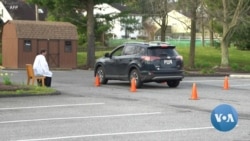As Americans celebrate Passover and Easter under the threat of COVID-19, the White House coronavirus task force is urging religious communities to adhere to social distancing guidelines.
U.S. Vice President Mike Pence this week said he will be attending a virtual service with his home church in the state of Indiana from his living room on Easter Sunday. He encouraged religious communities to follow social distancing guidelines from the Centers for Disease Control and Prevention.
“With Easter celebrations this Sunday, we just want to encourage every American to heed the counsel of the guidelines, put those into effect,” Pence said. He added that in doing so “we'll hasten the day that we put the coronavirus in the past and we reopen our country.”
As religious communities around the United States adapt to the new reality under COVID-19, whether it be Catholic drive-through confessions from the relative safety of the car or families sharing Seder meals virtually during Passover — there are stark differences between U.S. states in their guidelines for worship during the outbreak.
Citing political sensitivities and the protection of religious freedom, of the 39 states that have implemented stay at home orders, 12 allow some degree of exemption for worship and religious gatherings.
New Mexico and Florida for example, consider attending services in houses of worship an “essential activity,” and do not include congregations in a church, synagogue, mosque or other place of worship in the definition of "mass gatherings" that are barred.
Even in states where houses of worship must close during the pandemic, there have been violations. The Life Tabernacle Church in Louisiana hosted a service on Palm Sunday, violating the state’s stay-at-home guidelines.
"Everybody's fine,” said Tony Spell, the church’s pastor. “They would rather come to church and worship like free people than live like prisoners in their homes.”
His parishioner, Tim Hampton, said attending church is a necessity for him.
“I'm hungry, spiritually. I'm not scared of this virus. When it's my time, it's my time. Life goes on," Hampton said.
American religious attitudes
Although some U.S. religious leaders are still holding in-person services for their congregants, a recent survey on religious attitudes by the American Enterprise Institute showed that most Americans, including a majority of religious Americans, say that places of worship should not be exempt from mandatory government shutdowns of businesses.
Less than one in four (23%) Americans say churches and places of worship should be allowed to hold services, even if the government has banned other large gatherings. More than three-quarters (76%) of the public say they should not be exempt.
There are divisions between political conservatives and liberals, said Daniel Cox, AEI’s research fellow who worked on the survey.
“Conservatives and Republicans are more likely to say that that churches and places of worship should be given an exception to stay open, where the vast majority of Democrats and liberals, over nine in 10, say that they should not,” Cox said.
U.S. President Donald Trump has largely stayed out of the debate over religious gatherings amid the coronavirus outbreak. Recently, when asked about his stance on social distancing for places of worship, Trump responded “my biggest disappointment is that churches can’t meet in a time of need.”
Trump said he has considered endorsing the idea of outdoor services with social distancing on Easter Sunday, but was told by his health experts that it was too risky.






